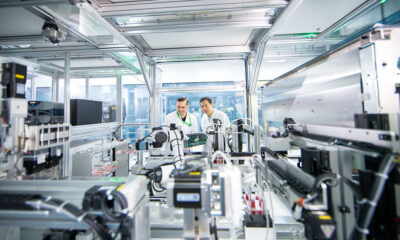News
Abu Dhabi’s Hub71 To Help Climate Technology Startups
The initiative was announced at the COP28 summit and will help selected startups with a $200,000 cash injection and further incentives.

Hub71, Abu Dhabi’s global technology system, has launched a new initiative to support climate technology startups backed by several of the UAE’s largest public and private sector organizations.
Known as the Hub71+ ClimateTech ecosystem, the program was announced at the COP28 climate conference in Dubai, with funding commitments from 25+ local and international partners already in place.
A total of 342 startups have submitted applications so far, with the top companies being added to a shortlist that will be revealed shortly. Selected startups will receive Dh250,000 ($68,000) in incentives and an upfront cash support package of Dh250,000. In addition, the top performers of Hub71’s new initiative will also receive a top-up of up to Dh250,000 in exchange for additional equity.
Ahmad Alwan, deputy chief executive of Hub71, said: “This initiative aims to bring in different entities that have a shared mission towards climate tech […] Throughout the journey, we will support these companies, not only from being startups to becoming mature companies but also to facilitate their engagement with entities that would support them with access to capital, market, and talent”.
The Hub71+ ClimateTech ecosystem is backed by the Abu Dhabi National Energy Company and the National Central Cooling Company, who have each pledged Dh500,000 to the initiative as anchor partners.
Also Read: Wisdom Motor Brings First Zero-Emission Bus To GCC
They are joined by corporate partners, including Abu Dhabi holding company ADQ, Aldar Properties, sovereign wealth fund Mubadala, First Abu Dhabi Bank, Masdar City, and Dubai’s Emirates NBD. In addition, Siemens Energy is also onboard as an anchor partner.
So far, Hub71 has helped 260 member startups and created over 1,000 jobs, according to the organization’s website. In addition, it has collectively raised around Dh5 billion since its foundation in 2019.
News
HiFuture Wraps Up Successful GITEX GLOBAL 2024 Appearance
The electronics company wowed audiences at the world’s largest tech event with a range of wearable and smart audio devices.

This year’s GITEX GLOBAL 2024 in Dubai saw a huge number of startups, electronics firms, and innovators from around the globe gather for the tech sector’s largest event of its kind. One company making waves at this year’s expo was Chinese tech group HiFuture, which showcased a range of products with a focus on wearable technology and smart audio.
At the HiFuture booth, the company captivated attendees with cutting-edge smartwatches like the ACTIVE and AURORA, along with a range of powerful wireless speakers, earbuds, and even smart rings. Visitors were eager to check out the sleek new designs on offer and even had the chance to test out some of the products themselves.

Among the highlights were smartwatches combining dual-core processors with customizable options. The devices blended style and technology, offering health monitoring capabilities, personalized watch faces, and advanced AI-driven functionalities, giving attendees a taste of the future of wearable technology.
On the audio front, HiFuture’s wireless speakers left a lasting impression, offering rich, immersive sound in compact, portable designs. These speakers cater to both intimate gatherings and larger celebrations, offering versatility for users. Meanwhile, the company also showed off its Syntra AI technology, which it claims “revolutionizes health and fitness tracking by combining advanced optical sensors with intelligent algorithms for precise, real-time insights”.
Also Read: How (And Why) To Start A Tech Business In Dubai
The presence of HiFuture’s leadership team at GITEX 2024 underscored the importance of this event for the company, with CEO Levin Liu leading a team of executives, all keen to engage with attendees and offer insights into HiFuture’s vision, product development process, and future direction.
Overall, it seems that GITEX GLOBAL 2024 has been a rewarding experience for HiFuture. The enthusiasm and curiosity of attendees shown to the company’s diverse range of products was obvious, with the HiFuture team leaving on a high note and clearly excited and motivated by the event.




























